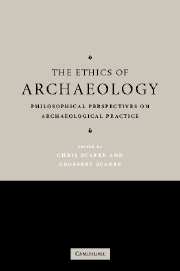Book contents
- Frontmatter
- Contents
- List of contributors
- Acknowledgements
- 1 Introduction
- PART I THE OWNERSHIP OF CULTURAL OBJECTS
- PART II ARCHAEOLOGISTS AND THE LIVING
- PART III ARCHAEOLOGISTS AND THE DEAD
- PART IV THE COMMON HERITAGE OF HUMANKIND?
- 13 A plea for responsibility towards the common heritage of mankind
- 14 The ethics of the World Heritage concept
- 15 What value a unicorn's horn? A study of archaeological uniqueness and value
- References
- Index
14 - The ethics of the World Heritage concept
Published online by Cambridge University Press: 05 June 2012
- Frontmatter
- Contents
- List of contributors
- Acknowledgements
- 1 Introduction
- PART I THE OWNERSHIP OF CULTURAL OBJECTS
- PART II ARCHAEOLOGISTS AND THE LIVING
- PART III ARCHAEOLOGISTS AND THE DEAD
- PART IV THE COMMON HERITAGE OF HUMANKIND?
- 13 A plea for responsibility towards the common heritage of mankind
- 14 The ethics of the World Heritage concept
- 15 What value a unicorn's horn? A study of archaeological uniqueness and value
- References
- Index
Summary
[T]he day may yet come when the United Nations flag will fly over cultural sites and natural areas of the World Heritage, constituting a system of international parks and landmarks transferred to the U.N. by member states.
(Meyer 1976: 63)When the American lawyer Robert L. Meyer in 1976 presented the UNESCO 1972 World Heritage Convention, he expressed the hope that objects of world heritage would one day be transferred from the national state to the international community, reflecting the optimism common at the time that globalisation would encourage the progressive unification of human interests. Developments in media and communications promoted the sense of belonging to a Global Village (McLuhan 1962) and the ideal of a One World Man (Mumford 1961: 573). The recognition of a global shared present influenced current interpretations of the past. It thus became natural to think that archaeological resources should ‘serve as symbols not of nations, but of the common human interest’ (Lipe 1984: 10), while the study of general scientific laws in archaeology should remove the political constraints of the past and return the discipline to a ‘universal humanism’ (Ford 1973: 93).
Although peoples of the world indisputably share a common present, globalisation's discontents have increasingly voiced their concerns during the 1990s. Whilst global economic injustice has been especially in the critics' sights (e.g., Stiglitz 2002), there have also been reactions against the global homogenisation of culture that emphasise the value of diversity and the local dimension (Hall 1991: 33).
- Type
- Chapter
- Information
- The Ethics of ArchaeologyPhilosophical Perspectives on Archaeological Practice, pp. 242 - 259Publisher: Cambridge University PressPrint publication year: 2006
- 17
- Cited by



